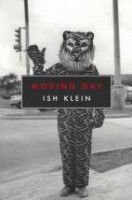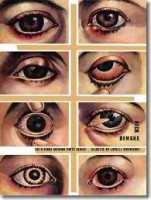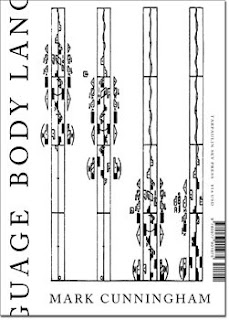Girl Without Arms by Brandon Shimoda
 Girl Without Arms
Girl Without Arms
by Brandon Shimoda
Black Ocean, 2011
96 pages / $14.95 Buy from Black Ocean or SPD
The title may be referencing a Grimm’s Fairytale called The Girl Without Hands. It could also just be about a girl without arms. I don’t know. It doesn’t seem integral to enjoying the work or attempting to understand it. The work is a trip, an experience more than a message, a system that works by itself. I’m going to quote a lot and talk a little.
Shimoda interrupts himself. The syntax is complicated in GWA. It’s like the syntax itself is surreal.
The Cabin goes up
In rhubarb. Rhubarb
Washes over-”
The many voices sometimes sound mid-sentence, mid-conversation, perhaps overheard. The words are mashed up and mixed together with impossible situations and small haiku moments.
Sometimes The Girl Without Arms feels like a poetry devoid of people. Like it sprung from the earth elementally, without being crafted by anyone or like it’s what’s left after all the people are gone. Sometimes it feels austere and lonely. There is a kind of transcendence in the small, the slightly off diction, the twisted cadences and syntax.
Do not move.
There are no people
Like it.”
In some sections it’s as if the people that might exist are so minimal as to be hard to notice. The little ecologies of Shimoda’s short unpredictable stanzas are aesthetically charged and abstract; they are essential tiny interrelated linguistic artifacts that seem to stand independent of time or context. Shimoda’s words tend to connote more than denote.
December 7th, 2012 / 6:03 pm
Ben Mirov is Unemployed, Reads Books, Lives in Oakland
 I just moved to Oakland, CA from Brooklyn, NY. I’m unemployed, so I’m reading more books than usual. And growing a beard. Here are some of the books surrounding me and some thoughts about them and a pic of my beard.
I just moved to Oakland, CA from Brooklyn, NY. I’m unemployed, so I’m reading more books than usual. And growing a beard. Here are some of the books surrounding me and some thoughts about them and a pic of my beard.
 Moving Day by Ish Klein (Canarium Books, 2011)
Moving Day by Ish Klein (Canarium Books, 2011)
Usually when someone says a book of poems is “weird” it means the poems are ephemerally weird. Like the weirdness is a novelty to grab attention. Real weirdness permeates content and form, like it does in Ish’s book. The sentences and lines are like little adjustments to the readers attention. It feels like your being nudged into an ultimately more complex and valenced sensitivity of your self and the world.
sample lines: Yes, yes larval. / Larvelous was the eye—the stars, / they were wondering, “When is X coming out?” / Considering the material, X will be something!”
 Nick Demske by Nick Demske (FENCE Books, 2010)
Nick Demske by Nick Demske (FENCE Books, 2010)
Sometimes when I read sonnets all I can think is “fuck sonnets”. I’m pretty sure Nick Demske thinks this too, which is why he wrote a book of sonnets. Feels like this book was written by your drug dealer friend in high school who was smarter and better read than everyone in your class, but was destined to burn out and spend the rest of his life as a low-level bureaucrat in the same town you grew up in. Poems feel like they are “in your face”. Some lines break in the middle of words in a way that is perturbing/engaging. Funny letter of congratulations on the back from Rep. Paul Ryan (R-WI), better than any blurb.
sample lines: Unsanitized hypodermia. Full dorsal poetry. Homos say / What. Say what? Say when. I’m going to buttfuck / You in the mouth. I know where you live.
July 1st, 2011 / 2:12 am
Breast Stein Blood Drug

1. Simmons is running in a fundraiser for breast cancer, and generously giving away unique objects if he gets $600 in pledges. Consider making a contribution.
Also, if you happen to be in Portland tomorrow, Simmons is reading with Tim Horvath in support of the new Conjunctions here.
2. At Jewcy, a great interview with Paris Review editor Lorin Stein by Adam Wilson.
3. Joe Hall & Brandon Shimoda discuss their recent titles from Black Ocean on the radio at The Blood-Jet Writing Hour.
4. Tao Lin has a new weekly column on Vice involving Drug-Related Photoshop Art.
3 New Titles from Tarpaulin Sky
New from TSky, check and buy!
 Teresa K. Miller
Teresa K. Miller
Forever No Lo
Chapbook. Poetry
4″ x 4.75″, saddle-sewn, french flaps, 36 pages
November 2008
$10 includes shipping in the US
– click here for more info & images
– click here to order
Vehicular homicide, relationship dissolution by imperceptible degrees, genocide, terror by war, linguistic disorientation—though not equivalent, they interact in Forever No Lo, through the self-consciously philosophical and the mundane swallowing international crisis. The setting is Portugal, but it is also East Oakland, Rwanda, Chicago, Iraq, nowhere discernible. The language fragments multivocally in broken Portuguese, elementary French, and dialectical English. This serial poem asks what comes of global and personal tragedy—what grows, haunts, decays, redeems—in the gut, on the news, or from local communities.
 Brandon Shimoda
Brandon Shimoda
The Inland Sea
Chapbook. Poetry.
6″ x 8″, perfectbound, black endsheets, 40 pages.
November 2008.
$10 includes shipping in the US
– click here for more info
– click here to order
In remembrance of and in thinking through the grand and generative compromises of birth, migration, dementia, sacrifice and ancestor worship, The Inland Sea is a raveling entreaty for the life of both a family departed and a family spectrally present in both complex breath and body. Spiritually addressed to Midori Shimoda, as well as factually to the inland seascapes of his birth (Hiroshima, Japan, thrice, in 1909, 1910 and 1911) and death (Lake Norman, North Carolina, the United States, once, 1996), The Inland Sea navigates the substance between origination and departure, in an attempt to find a relic of responsible and radiant life outside of benighted time. Composed of doubts, dissolutions, laments and a widening circumference of water and hope, The Inland Sea is a soft, yet urgent, ceremony, through which the ruptures of the past might find celebratory echo, and keep—
ISBN: 9780977901975
Prose Poetry. 5″x7″, 136 pages
Perfectbound, tête-bêche
– Click here for more info
– Order here ($14 includes shipping in the US)
Two full-length collections of prose poems contained in Body Language, one titled Body (on parts of the body) and one titled Primer (on numbers and letters), together form a diptych investigating the body in language and language in the body.
Advance Praise for Body Language
In Mark Cunningham’s asymptotic collection, two discreet texts, Body and Primer, form a provocative, loopic continuum in which prose poems “defining” body parts (The Spleen, The Pituitary Gland, The Pimple, The Thumb) mesh with an abecedarium/cipher concerning topics as various as fate, reality, and phenomenology. With its trope of clue-like instruction and unique, flip-book embodiment, Cunningham‘s book creates a kind of hybrid detective f(r)iction, an intrepid mash-up of high and low cultures in which the reader is as likely to encounter Rilke and Proto-Sinaitic inscription as Lacan, Film Noir, The Three Stooges, cell phones, higher mathematics, binary thought, and Coyote and Road Runner cartoons. Cunningham pitches with surprising clarity the most abstract meditations (“The sperm cell is the first zero. The vagina the second. Wait—before you floated in the placenta (the third), your mother floated and your father floated in theirs, and before them their others and their fathers . . . . You get dizzy, as in that moment in Citizen Kane when Kane pauses after leaving his wife’s bedroom and image after image recedes in mirror reflecting mirror. Another thing about DNA: if space curves, so does time,” for example, from “O as a Beginning”), offering in almost reportorial style a (d)evolutionary mix of anachronistic, equally relentless somatic and figurative explorations of the body (“a paradise of sorts”) and the mind. Northrop Frye called a riddle “essentially a charm in reverse . . . the revolt of the intelligence against the hypnotic power of commanding words.” Cunningham’s work moves in this direction; as Frye would put it, “Poem and object are very quizzically related: there seems to be some riddle behind all riddles which we have not yet guessed.” These poems are not the mere game-playing of an extraordinarily gifted and restless intellect; stalked by pain, fear, guilt, and the burden of awareness,, they can also be tender, betraying a capacity for happiness: “I rarely talk about myself, but I’ll tell you this: one of the best days I’ve had was when I passed a cinema and decided right then to see The Cameraman. Another time, I switched restaurants at the last minute, and met an acquaintance there, and ate with her, and three years later we’re still going out.” As obsessed as they are with the ironies and processes of mind and body, the poet’s concern is ever with the mysteries this human armature holds up: “life itself.”
—Lisa Russ Spaar, author of Satin Cash and Blue Venus, and editor of Acquainted with the Night and All That Mighty Heart: London Poems.
About the Authors
Teresa K. Miller received her MFA from Mills College. Her work has appeared in Tarpaulin Sky, ZYZZYVA, Columbia Poetry Review, MiPOesias, Coconut, DIAGRAM, Shampoo, and others. Originally from Seattle, she currently teaches in Oakland.
Brandon Shimoda was born in California, and has since lived in five countries and nine states, most recently North Carolina and Montana. His writings have made appearances in Colorado Review, Denver Quarterly, Fence, jubilat, Octopus Magazine, Practice: New Writing + Art, TYPO, Verse and elsewhere, as well as in two recent book projects, Lake M (Corollary Press) and The Alps (Flim Forum Press). He currently lives in the state of Washington, where he takes part in the lives of both Slope magazine and Wave Books, among other takings, partings and taking-aparts.
Mark Cunningham lives in central Missouri. He is the author of 80 Beetles (Otoliths, 2008) and two chapbooks from Right Hand Pointing, Second Story and the forthcoming nightlightnight.
Fence Likes Obama Too
 If you didn’t get enough of Barack Obama in the past few weeks, well, it’s your lucky day because the man himself is on the cover of the new Winter issue of poetry/fiction/essay lit mag FENCE.
If you didn’t get enough of Barack Obama in the past few weeks, well, it’s your lucky day because the man himself is on the cover of the new Winter issue of poetry/fiction/essay lit mag FENCE.
I like Obama. I’m just not sure why he’s on the cover of FENCE. Maybe it’s a political issue, but it doesn’t look that way.
Since FENCE moved and teamed up with SUNY ALBANY I’ve seen the mag take a nose-dive.
Still, I’m interested in every issue. It’s just not the same. Maybe it’s the university connection that bothers me. Or that the content has seemed to suffer. I’m sure there is some solid work in this issue — I’ve especially interested in the work by Brandon Shimoda who I’ve been reading online and being blown away by.
But I do find it strange that a SUNY Professor (Edward Schwarzchild) is included in the issue. Maybe this isn’t such a big deal. Maybe other university journals include their own staff?
FENCE always seems to catch my interest no matter what they are doing. You can stay up-to-date by checking out the FENCE PORTAL BLOG.
November 12th, 2008 / 12:16 pm
Brandon Shimoda’s THE INLAND SEA
 Now available for preorder from Tarpaulin Sky Books is Brandon Shimoda’s THE INLAND SEA, which is 40 pages of poem with a killer cover (covers, like teeth blood, do matter). I’ve always liked Brandon’s work I’ve seen around, and so am interested to see how this one comes together in palpable form.
Now available for preorder from Tarpaulin Sky Books is Brandon Shimoda’s THE INLAND SEA, which is 40 pages of poem with a killer cover (covers, like teeth blood, do matter). I’ve always liked Brandon’s work I’ve seen around, and so am interested to see how this one comes together in palpable form.
Here’s the jacket description:
In remembrance of and in thinking through the grand and generative compromises of birth, migration, dementia, sacrifice and ancestor worship, The Inland Sea is a raveling entreaty for the life of both a family departed and a family spectrally present in both complex breath and body. Spiritually addressed to Midori Shimoda, as well as factually to the inland seascapes of his birth (Hiroshima, Japan, thrice, in 1909, 1910 and 1911) and death (Lake Norman, North Carolina, the United States, once, 1996), The Inland Sea navigates the substance between origination and departure, in an attempt to find a relic of responsible and radiant life outside of benighted time. Composed of doubts, dissolutions, laments and a widening circumference of water and hope, The Inland Sea is a soft, yet urgent, ceremony, through which the ruptures of the past might find celebratory echo, and keep—
I like TSky’s books, this should be no exception.
Next post is mean, promise.


